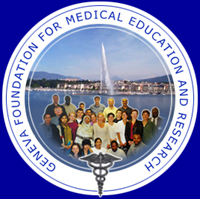The Health Management: a matter urgently important in medical education
La Administración de Salud: una materia urgida de trascendencia en la educación médica
Regla de la Caridad Poveda Rodríguez1, Alberto Morales Salinas2
1 Provincial Center of Hygiene and Epidemiology. Villa Clara. Cuba. E-mail: reglapo@infomed.sld.cu
2 "Ernesto Guevara" Cardiological Center. Villa Clara. Cuba. E-mail: reglapo@infomed.sld.cu
To the editor:
The purpose of this letter is to outline the authors' criteria in relation to the importance they grant to the Health management subject within the medical studies, and at the same time to promote the debate on the subject among readers.
In his article, Fernández Sacasas1 stated: "Medical education can be conceived as the set of processes inherent to undergraduate and postgraduate education, also continuing education, which promote the development of professional skills in students in health care aspects, teaching, research and management, framed in the health, educational and social reality of each institution and country. However, the authors of this letter consider that as a matter of the medical sciences the Health Management still lacks the special significance it deserves.
In publications in other contexts, it has been pointed out that doctors are often called upon to lead at different hierarchical levels, and they lack experience and specific preparation regarding the management process.2 The Cuban health system is not exempt from these difficulties.
The history of teaching hygiene, epidemiology and health management in the undergraduate program dates back to 1842, with two subjects covering all hygiene education (private and public hygiene), however, from 1962 on, After the Revolutionary University Reform, the subject Preventive Medicine was created, which was maintained until the beginning of 1970. During the 1981-1982 academic year the decentralization of the teaching of Hygiene and Epidemiology was achieved towards polyclinics in the community, Which constituted a qualitative step forward, and it is then that the subject Theory of Health Management was included. As early as 1985, the work was introduced in rotations and established the Hygiene, Epidemiology and Health Management Theory.3
In these circumstances, outstanding physicians in their specialty were called upon to manage at various hierarchical levels of the system, even though they lacked experience and specific training in that task, so their training was necessary. For this reason, in 1994, on behalf of the Pan American Health Organization, Dr. Vela Valdés and Dr. Fernández Sacasas carried out an investigation4 on the public health disciplines in the curriculum of the medical career in Cuba by the dissatisfactions about the importance of this matter in medical studies. It concludes that: "... it is necessary to continue addressing the improvement of this program and the organization of the whole block of medical-social subjects of the fifth year of the medical career", and that is when, in 1996, the subjects-rotations were unified: Theory and Health management and Hygiene and Epidemiology under the name of Public Health.
Later, in the improvement of the Curriculum in 2010 5was conceived the subject Public Health where Health Management is part of, for the 5th year as planned by Vela Valdés and Fernández Sacasas; the teaching hours of the program increased with respect to the total hours of the curriculum and their organizational forms of teaching were improved, giving priority to the in-service training, practical activities, seminars and independent student activity. This curricular improvement also included the introduction of a new curricular strategy: public health and environmental training as a way to achieve greater coherence in the curriculum.
It is necessary to consider that the Health Administration provides the graduates with the necessary tools to develop an overall vision of the system, optimize human, technical and financial resources, and bring health institutions to a state of growth and efficiency that allows a steady improvement of health in the population, family, community and the environment.
Taking into account that management is one of the functions designed for the graduated general practitioner in which it executes administrative actions in agreement with the public health organization, which allow them to mobilize the resources of the system in the fulfillment of its health care activity, guaranty its use and optimal control and assessment. These authors consider that although the subject Public Health with its component relating to the Health management began as a daring experiment, it is already a necessary reality in medical studies, worthy of greater transcendence in the teaching of its contents; and its implementation as a systematic curricular strategy is of vital importance for the academic training of future graduates in their work, which may be not only in health care, but also as organizer of administrative processes related to the population health.
Declaration of interests
The authors declare no conflict of interest.
BIBLIOGRAPHICAL REFERENCES
1. Fernández Sacasas JÁ. Aspectos distintivos de la educación médica cubana. EDUMECENTRO [Internet]. 2012 [citado 23 Mar 2017];4(3):[aprox. 2 p.]. Disponible en: http://scielo.sld.cu/scielo.php?script=sci_arttext&pid=S2077-28742012000300001
2. Pavón-León P. Gogeascoechea-Trejo MC. La importancia de la administración en salud. Rev Médica de la Universidad Veracruzana [Internet]. 2004 [citado 23 Mar 2017];4(1):[aprox. 4 p.]. Disponible en: https://www.uv.mx/rm/num_anteriores/revmedica_vol4_num1/articulos/admon-salud.htm
3. Martínez Calvo S. Evolución Histórica de la Enseñanza de la Medicina Preventiva en la Carrera de Medicina en Cuba. La Habana: Escuela Nacional de Salud Pública; 2010.
4. Vela Valdés J, Fernández Sacasas J. Las asignaturas de salud pública en las políticas de formación para la carrera de medicina. Rev Cubana Salud Pública [Internet]. 2012 [citado 20 Mar 2017];38(3):[aprox. 10 p.]. Disponible en: http://scielo.sld.cu/scielo.php?script=sci_arttext&pid=S0864-34662012000300005
5. Ministerio de Salud Pública. Plan de Estudios Perfeccionado. Carrera de Medicina. Resolución Ministerial No. 23/2013. La Habana: Minsap; 2013.
Submitted: April 27 2017.
Accepted: May 2 2017.
Regla de la Caridad Poveda
Rodríguez. Provincial Center of Hygiene and Epidemiology. Villa Clara. Cuba.
E-mail: reglapo@infomed.sld.cu
Copyright (c) 2017 EDUMECENTRO










